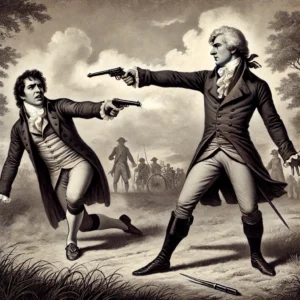 On July 11, 1804, one of the most infamous duels in American history took place between Aaron Burr, the sitting Vice President, and Alexander Hamilton, the former Secretary of the Treasury. The duel occurred in Weehawken, New Jersey, on a secluded ledge along the Hudson River, a popular dueling ground of the time. The confrontation was the culmination of years of personal and political animosity between the two men. Burr and Hamilton had clashed repeatedly over various issues, including political ideology, personal slights, and the contentious election of 1800, which saw Hamilton’s influence tip the scales in favor of Thomas Jefferson over Burr. The final straw came when Hamilton allegedly disparaged Burr’s character at a private dinner, prompting Burr to challenge him to a duel.
On July 11, 1804, one of the most infamous duels in American history took place between Aaron Burr, the sitting Vice President, and Alexander Hamilton, the former Secretary of the Treasury. The duel occurred in Weehawken, New Jersey, on a secluded ledge along the Hudson River, a popular dueling ground of the time. The confrontation was the culmination of years of personal and political animosity between the two men. Burr and Hamilton had clashed repeatedly over various issues, including political ideology, personal slights, and the contentious election of 1800, which saw Hamilton’s influence tip the scales in favor of Thomas Jefferson over Burr. The final straw came when Hamilton allegedly disparaged Burr’s character at a private dinner, prompting Burr to challenge him to a duel.
The morning of the duel was tense and somber. Both men arrived with their seconds, who were responsible for the formalities and ensuring the duel was conducted according to the code duello. After taking their positions, the men fired their pistols. Hamilton’s shot missed Burr, hitting a tree branch above his head, while Burr’s shot struck Hamilton in the lower abdomen. Hamilton fell immediately, gravely injured. He was transported back to New York City, where he died the following day, surrounded by family and friends. Hamilton’s death sent shockwaves through the nation, as he was not only a prominent founding father but also an architect of the country’s financial system and a key figure in the early republic.
The duel had far-reaching consequences for both men and the nation. Hamilton’s death was widely mourned, and his contributions to the fledgling United States were celebrated, cementing his legacy as a pivotal figure in American history. For Burr, however, the duel marked the beginning of his political downfall. He was charged with murder in both New York and New Jersey, though the charges were eventually dropped. Nonetheless, Burr’s reputation was irreparably damaged, and he became a political pariah. The duel underscored the intense political rivalries of the time and the extreme measures some were willing to take to defend their honor. It also led to a gradual decline in the practice of dueling, as public opinion began to shift against such violent resolutions to personal disputes.
